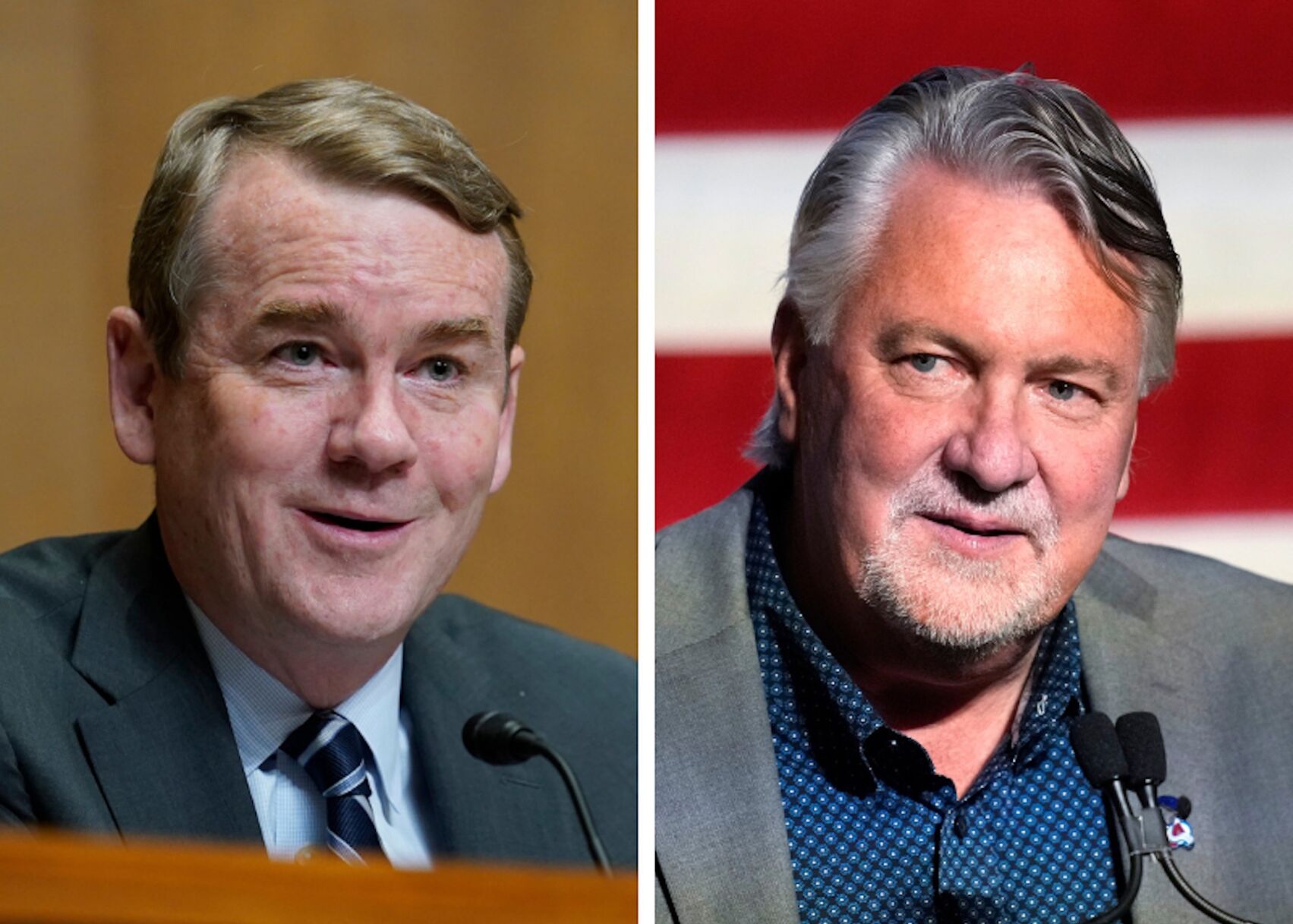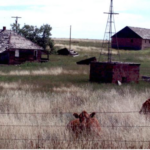Bennet, O’Dea insist California, Arizona, Nevada must ‘step up’ amidst Colorado River crisis

Joe O’Dea, the GOP contender for the U.S. Senate, insisted that the Upper Basin states, which include Colorado, shouldn’t be “held responsible” for drastic reductions in water use and that California, Nevada and Arizona should “step up,” arguing the latter have been overusing their allotment from the Colorado River.
Meanwhile, U.S. Sen. Michael Bennet, who hopes to keep his seat, emphasized his work to bring fiscal resources to Colorado and the rest of the West, which face a decades-long drought condition compelling them to explore potentially drastic solutions to their water woes.
The major parties’ candidates for U.S. Senate trekked to Steamboat Springs Tuesday to speak at the Colorado Water Congress’ summer conference about how they would address the crisis on the Colorado River and other water issues.
O’Dea, a business owner, is a new face at Water Congress, although his construction company has worked on some of the state’s more recent storage projects, including expansion of Chatfield Reservoir and the Windy Gap Firming Project in northern Colorado, which broke ground on Tuesday.
The GOP candidate repeated claims that the lower basin states are overusing their apportionment, while Colorado and its upper basin partners have been underusing their allotment by a million acre-feet per year. Some water experts in Colorado dispute that claim.
“We shouldn’t be held responsible” for reductions on the Colorado River, O’Dea said.
California has to step up, O’Dea said, referring to Aug. 13 plans announced by the U.S. the Bureau of Reclamation that some view it as “underwhelming.”
“I’ve been an advocate for Colorado water to stay here in Colorado” as much as possible, he said, adding, “We need the lower basin states to step up and do more.”
Federal government's 'underwhelming' plan for the Colorado River falls short of goal
O’Dea also advocated for more water storage, arguing that is also part of the solution for the state’s water supply challenges. He said permitting process takes much too long.
Addressing a question from the audience, O’Dea said he would advocate for spending some of the infrastructure dollars from the federal bill for water storage.
He also called for an approach that balances the competing demands for water, adding it’s the most difficult resource the state manages.
“When it comes to governing the use of our water resources, the choice must be a balance that finds a way to get water to the people, while protecting the rights of farmers who supply them food, a balance that gets water resources to industry and manufacturing, but protects rural communities and stream flows and fisheries,” O’Dea said.
He indicated he is opposed to buy and dry, the practice of buying water rights from farmers and ranchers and transferring it to municipal or industrial use. He called that approach devastating for rural communities, as well as for the environment.
Colorado Politics asked O’Dea about his position on a project that seeks to buy water rights in the San Luis Valley and transport that water to Douglas County. He said if both basins can’t come to an agreement, it probably shouldn’t happen.
“Alamosa has a stake in that, if they’re not happy with the result, it shouldn’t come together,” he said.
O’Dea also addressed climate change, saying there is “no doubt that the climate is getting warmer and drier.”
That, he said, creates a situation with too many people and not enough water.
“The only solution to this difficult problem is found in collaboration and innovation,” he said, with water users and conservationists working together. He pointed to the Windy Gap project as an example of that kind of collaboration, saying it proves that “win-win” is still possible in politics.
Bennet, a Democrat from Denver who is a regular at the summer conference, started off by reminding people he sought an appointment to the Senate Agriculture Committee because he wanted to learn about agriculture and water. It’s allowed him to put Colorado’s priorities for ag and water, as well as forest health at the top of the agenda, Bennet said.
Bennet noted his accomplishments in this arena for the past 13 years, including two farm bills, along with locally-led conservation programs for farms and ranches.
Bennet spoke of at length about funding he’s brought back to Colorado for water and agriculture, including $575 million to protect watersheds after the catastrophic fires two years ago, and $60 million for the Arkansas conduit project, the first bill he wrote after joining Congress. Another $14 million in federal money is headed to Windy Gap, which will cover almost half of the cost of the channel portion of the project.
Most importantly, Bennet said, is his work to elevate the importance of water in the West on the national agenda. He said he’s made the case over and over in Washington over the last several years, explaining, for example, to Senate Majority Leader Chuck Schumer of New York that water is more important to Colorado’s economy than the Brooklyn Bridge or Lincoln Tunnel is to the economy in New York.
“We made the case” for dealing with the dire conditions, which led to historic investments to deal with drought, Bennet said, pointing to the $8 billion for water in the infrastructure bill and $4 billion in the inflation reduction legislation to specifically deal with Western drought.
He noted the legislation resulted from negotiation – Schumer wanted $1 billion, while Sen. Krysten Sinema, D-Ariz., wanted $5 billion, all for the lower basin states. The $4 billion – the amount negotiators settled on – would be available for projects among the seven states that rely on the Colorado River.
Bennet also noted the reclamation bureau’s Aug. 13 announcement, claiming the upper basin states had used a million acre-feet less water last year.
“We made sacrifices to do more with less,” he said.
That said, temporary mandates are not going to cut it, he added.
“Any long term solution requires permanent reductions” by the lower basin states, Bennet said, adding all parties will have to live with what the Colorado River provides.
Bennet also addressed federal funds for climate change from the Inflation Reduction Act, saying Washington has gone from doing virtually nothing on climate to setting an example for the world on a responsible energy policy that will bolster energy independence.
Next up is to build on that progress and make sure the money gets to the right projects, Bennet said.
“This is only a down payment on what’s required,” he said, adding the work isn’t done.



